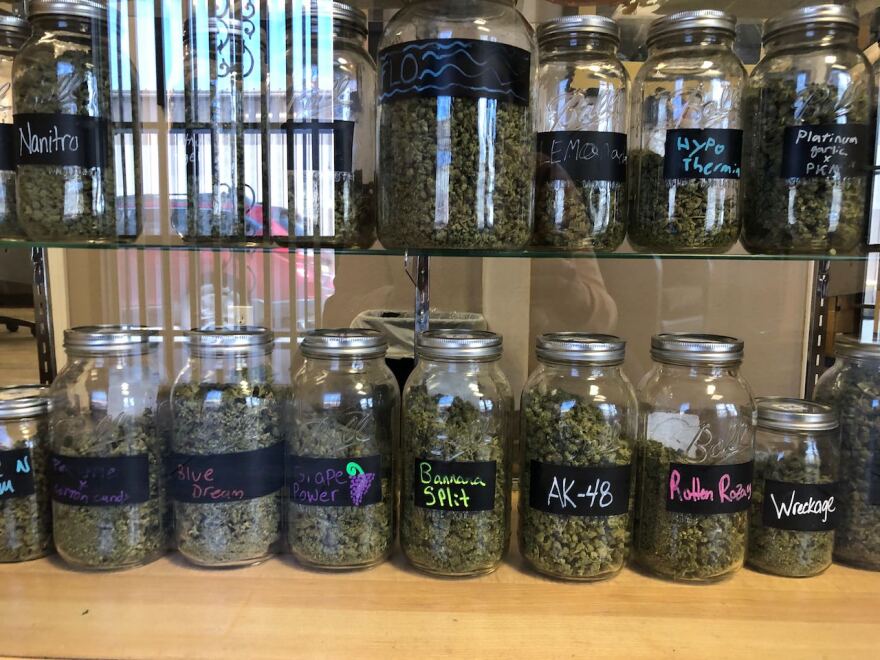A few days ago, Vinnie Enciñas was in the back room of Ultra Health dispensary in Santa Fe, rolling dozens of joints. He uses a spice grinder, a scale and a little funnel to get the cannabis finely ground and the quantities right, but he still twists them up by hand.
"The ones that are done by machine don't smoke as good," he said, placing them in neat rows in a rack.
Enciñas is a budtender, a curator of different strains and formats of cannabis products, and as recreational cannabis becomes legal here from April 1, he's anticipating new customers in this business which previously catered to the state's long standing medical marijuana market.
"We're going to make it comfortable," he said. "We want to make it feel homey. We have music playing, we have smiles on our faces. We're joking with everyone."
Even when selling medical marijuana, he said one of the most rewarding parts of the job is when people who have never used cannabis have a good experience.
"We walk them through it step by step. Maybe they want to do some edibles, maybe they want to try a tincture, maybe they want to try actually smoking the flower," he said. "And then it's even more rewarding when they come back and tell me 'this helped me'."

All over the state, cannabis enthusiasts – and probably some first-timers – are celebrating the legalization of cannabis for recreational use for over-21s, who can now buy and possess 2oz of cannabis, 16g of concentrate and 800 mg of edibles at one time, although smoking and ingesting in public is still not permitted.
The arguments for legalization have always combined economic possibility – officials have predicted $50 million in tax revenue in the first year and the creation of as many as 11,000 jobs – with social equity, as studies show that low-income communities and people of color have been disproportionately criminalized for cannabis-related offenses.
So as the recreational industry gears up, many are trying to ensure that the benefits will be shared equally.
"For me, it has always been about social justice," said State Representative Javier Martínez, a Democrat from Bernalillo County, who worked for years on legislation. "It includes ensuring that people of color and lower income communities, those communities most marginalized by the War on Drugs, get a fair shake in this new industry."
Martínez said that growing up as a child of Mexican immigrants, in a lower-income part of Albuquerque, he saw, "classmates of mine in high school arrested, and their lives completely derailed, from having small amounts of cannabis on their person," as well as family caught in drug-related violence in Mexico.
So he said he's proud that the state's new regulations include microbusiness licenses for small-scale businesses growing or selling cannabis. A loan fund has been approved that is set to provide up to $250,000 to pot start-ups.
Under separate legislation passed last year, measures are now underway for people who have previously had low-level convictions for cannabis to have their records expunged automatically.
"As you compare it to legalization efforts across the country and across the world, this legalization framework is one of the most equitable ones, if not the most equitable," Martínez said.
New Mexico is the 18th state to legalize recreational weed, and the government has made efforts to avoid pitfalls other states have faced. This included having New Mexican police meet with their counterparts in Colorado, which legalized a decade ago, to discuss things like how to avoid a proliferation of illegal grow operations, according to Santa Fe Chief of Police Paul Joye.
And the state's efforts to support small businesses come as the industry is increasingly dominated by big players nationwide, as attorney and drug policy activist Shaleen Title noted in a research paper earlier this year.
One person hoping that the industry's opportunities will be open to all is Izzy Chiuchiarelli, who is planning to open The Village Bakehouse in Albuquerque, a shared kitchen facility for small businesses to make edible cannabis products.

"One part of this industry that was really, really important to me was social equity," she said. She hopes the Bakehouse will be a valuable support for smaller businesses, as well as a successful enterprise in its own right.
"I think that really what is important is just keeping the focus on diversifying the industry, which means the BIPOC [Black, Indigenous and people of color] community. It could be people who might have been criminalized by cannabis in the past. It could be many different things."
So far, she said she has been encouraged by the diversity of people who have shown an interest in renting space in her facility.
However, start-ups face hurdles that established dispensaries do not. Chiuchiarelli's business is not ready to open because of supply chain issues that have delayed deliveries. She said other businesses have had similar problems, and reports suggest that there may be shortage of product in the months ahead.
Ultra Health dispensary in Santa Fe, where Vinnie Enciñas was stocking up, is part of a chain that has long dominated the medical marijuana industry in the state. Its CEO is Duke Rodriguez, who has advocated for full legalization, arguing for destigmatizion of cannabis and for, "the huge economic boom that can come from legalization: more jobs, more opportunity, more tax revenue."
But he predicted problems for smaller entrants to a market which already has big players like him in it.
"The risks are greater today than when I got into it," he said. "And I want folks to understand that there's no guarantee in this industry."







